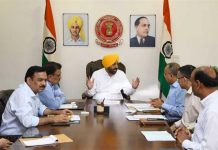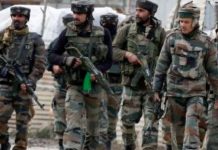
Photo: Shailendra Pandey
SOMETIMES, WORDS can haunt even decades later and become a powerful leitmotif. Rajiv Gandhi’s infamous words — when a big tree falls, the earth shakes — during the brutal massacre of Sikhs in 1984 is one such sentence. It has peppered discussions and debates for 25 long years and it is this chillingly cold analogy that still records a high nine on the emotional Richter scale, so powerful is its recall.
This time, the earth shook again, but under the Congress’ feet. One boot thrown at the Home Minister P Chidambaram by a journalist was enough to uncork the lava and focus attention straight and square on the anti-Sikh riots once again. But this time, if the earth shook it was because of the timing of the shoe-throwing incident. It came in the midst of the general election, a crucial election in which the Congress-led UPA is fighting to reclaim power.
It has been an election issue even earlier. Both Sonia Gandhi and her son, Rahul Gandhi, have in the past made a political point of apologizing to the Sikh community in Amritsar’s Golden Temple, the most-revered gurudwara. The shoe was a mere reminder that Carnage 1984 still has the potency to trigger an election flashpoint.
As soon as the shoe was thrown, various Congress leaders were besieged with frantic phone calls from Punjab and its state unit in Delhi. Every single one of the 13 Lok Sabha seats in Punjab is linked to the Sikh vote bank and nobody in the Congress high command could afford to alienate a community that comprises 59.9 percent of the state’s population. No one could afford to overlook the negative impact of fielding Jagdish Tytler and Sajjan Kumar, the two most prominent and maligned faces of 1984 from the Capital city of Delhi where Sikhs were slaughtered in the worst massacre. Sikh votes add up to 25 percent of the total votes in Delhi’s seven Lok Sabha segments.
Till the day the journalist flung his shoe, it was all about winnability, not accountability; about victory in the public arena, not justice in the courtroom. Till then, the Congress was looking at the Sikh vote bank differently — Tytler had won the Delhi Sadar seat four consecutive times, beaten Vijay Goel, the formidable BJP candidate in 2004 by 16,000 votes and, in any case, the Sikh votes total a mere 1.20 percent, the least in Delhi. In the case of Sajjan Kumar too, the Sikh votes comprise only two percent and his victory margin was much larger — he had won the outer Delhi seat by an overwhelming two lakh votes, defeating former BJP chief minister, Sahib Singh Verma.
|
Nov 1984 MARWAH COMMISSION |
May 1985 MISRA COMMISSION |
Nov 1985 DHILLON COMMITTEE |
Feb 1987 KAPUR-MITTAL COMMITTEE |
Feb 1987 JAIN-BANERJEE COMMITTEE |
|
Feb 1987 AHOOJA COMMITTEE |
Mar 1990 POTTI-ROSHA COMMITTEE |
Dec 1990 JAIN-AGGARWAL |
Dec 1993 NARULA COMMITTEE |
May 2000 NANAVATI COMMISSION |
The shoe sent the carefully crafted calculations out of the window. As Sikhs protested across Delhi and Punjab, the case against Tytler took center stage once again. If Tytler was forced to call a press conference in which he announced his withdrawal from the electoral fray, it was not because he wanted to save his party the embarrassment, as he put it, but because he’d had a midnight knock. Senior Congress leader, Oscar Fernandes, sources reveal, made a nocturnal call in which the message was delivered clear and straight — if he did not make the announcement himself, the party would be forced to make it and that would be even more embarrassing. But it would be unwise for anyone to think that the embarrassment was Tytler’s alone.

Photo: Vijay Saluja
When a big tree falls, the earth shakes.
IF TYTLER and Sajjan were summarily axed as potential candidates it was because of the potent recall factor. The CBI’s leak that Tytler had been given a clean chit ignited the spark for the nth time in 25 years. The ghost of 1984 was back and the voice of the victims could be heard once again. The most damning testimony is that of Surinder Singh, who was the Head Granthi of Gurdwara Pul Bangash near Delhi’s Azad Market. This is what he saw and this is what he has testified to on sworn affidavits: “On 1st November 1984 in the morning at 9am a big mob which was carrying sticks, iron rods and kerosene oil attacked the Gurdwara. The crowd was being led by our area Member Parliament of Congress (I) Jagdish Tytler. He incited the crowd to set the Gurdwara on fire and to kill the Sikhs. In the crowd some people were having in their hands the flags of Congress party and they were raising slogans such as, ‘The revenge of blood will be taken by blood, the Sikhs are traitors, kill them, burn them’. Five to six policemen were also with the crowd. On incitement by Jagdish Tytler, they attacked the gurdwara and set it on fire. Thakur Singh, who was a retired inspector of Delhi Police and an employee of the gurdwara Managing Committee, was killed by the crowd. Badal Singh, who was the Sewadar of the gurdwara, was burnt alive by putting a burning tyre around his neck. This whole incident was helplessly witnessed by me from the upper floor of the gurdwara. The gurdwara was on fire, but the fire did not reach the upper floor.”
As soon as the shoe was thrown, Congress leaders were besieged with frantic phone calls from its Punjab unit. All 13 Lok Sabha seats in the state are linked to the Sikh vote bank
In the face of such a powerful testimony, why then is Tytler on the verge of a clean chit? The Congress politician refuses to answer any questions, refuses to be drawn into a discussion on his role or the clean chit. A TEHELKA reporter tried over three consecutive days to get his side of the story, but all he would say is this: “You have published lies about me. I will not answer your questions.”

Photo: S N Sinha
The ‘lies’ — or conversely the uncomfortable truth — that Tytler is referring to is a detailed, month-long investigation undertaken by TEHELKA in 2005. Over one month, we uncovered lie from truth, sifted fact from fiction. Slowly but surely, we blew the lid off the machiavellian attempt through which Tytler, Sajjan Kumar and HKL Bhagat had gone about the task of subverting and derailing justice.
THE TRUTH often lies buried in small details and it is often hard to find. The investigation is worth recounting, worth retelling. This is what we found.
The dead cannot strike a deal but the living did. They were coerced and threatened by a network of middlemen who struck dubious deals to win over witnesses, subvert the truth and derail justice. Investigations reveal that in almost all cases, deals were struck to win over witnesses. In Bhagat’s case, Rs 25 lakh was offered to a witness. In Tytler’s case, a week after changing his statement, the prime witness went abroad for a year, and the second witness is still in the US. There were threats to their lives as well and a prominent Sikh leader was involved in pressurising the witness to say Tytler didn’t lead the mob. Further sensational disclosures were made that a prime witness, who turned hostile against Sajjan Kumar was taken to the Congress leader’s residence.
But this story is primarily about Tytler and his effect on the political Richter scale. It is important to return to Surinder Singh, the main eyewitness who testified to Tytler’s role. Surinder, like the other victims, was not immune to pressure from the middlemen and their masters. Commission after commission gave birth to sub-committee after sub-committee but it was during the hearings of the Nanavati Commission that both Surinder and Tytler stood rattled.
Tytler withdrew from the electoral fray not because he wanted to save the party embarrassment, but because he’d had a midnight knock from a senior Congress leader
When Nanavati Commission summoned Jagdish Tytler on Surinder’s affidavit, the Head Granthi appeared like he had been ‘managed’. Tytler drew the Commission’s attention to another affidavit by Surinder, this one dated August 5, 2002, which amounted to a retraction of Singh’s earlier position — he said he did not even know what was in the earlier affidavit because he could not read or write English. He also said he had not seen Tytler leading the mob that attacked Gurdwara Pul Bangash. This affidavit was filed on October 22, 2002 and it came to light a year later when Tytler was served a notice to appear before the Commission.
The Congress leader’s knowledge of such an affidavit astonished the Commission as Surinder Singh had named Tytler in his testimony on January 17, 2002.
Tytler had been trying to work on Surinder Singh. In his testimony to the Nanavati Commission, Surinder Singh did state that he was contacted by Jagdish Tytler on November 10, 1984 and asked to sign two sheets of paper. He declined to sign. But subsequent efforts by Tytler to ‘win over’ Singh appear to have succeeded.
The dead cannot strike a deal so the living did. They were coerced and threatened by a network of middlemen who struck dubious deals to win over witnesses and subvert the truth
About Surinder Singh’s changed affidavit, Justice Nanavati stated, “What appears from all this is that the subsequent affidavit was probably obtained by persuasion or under pressure. If this witness had really not seen Jagdish Tytler in the mob, or if he was not approached by Tytler, then he would not have come before the Commission to give evidence or would have told the Commission that the attack did not take place in that manner. For speaking the truth, it was not necessary for him to wait till 5-8-2002 and file an additional affidavit.”
So when Nanavati finally submitted his report in 2005 and found what he called “credible evidence” against Tytler, Prime Minister Manmohan Singh was forced to ask him to quit the Cabinet. In an emotional speech, the prime minister said, “I have no hesitation in apologising, not only to the Sikh community but to the nation because (the riots) negated the concept of nationhood. I bow my head in shame for what happened… but there are ebbs and tides in a nation’s history.” Admitting that the past cannot be undone, he urged: “But we have the willpower to write a better future and ensure such incidents are not repeated.”

Photo: Vijay Pandey
Strong words from an emotional Sikh Prime Minister acted as balm then, but what happened subsequently was a shame. The premier investigative agency, after a gap of two years, approached Delhi’s lower court with a closure report, but the court ordered that the case against Tytler be reinvestigated. The CBI was forced to go back to Surinder Singh, who then gave a fresh affidavit saying, “In case I die, then Jagdish Tytler will be responsible for the same. Jagdish Tytler had put great pressure on me and had obtained my signatures on blank papers… threatened me that in case I speak against him in future, then me along with my family will be finished.” This damning disclosure was obtained by the CBI on February 12, 2008.
The CBI, in fact, would not have tracked down Surinder if it were not for the courts. The agency had approached the court asking for the case to be closed since it had not been able to find another witness in the Tytler case. Jasbir Singh, in an affidavit to the Nanavati Commission, had stated that he saw Tytler inciting a group of people near Kingsway Camp in Delhi to kill Sikhs on the night of November 3, 1984. Jasbir has been in the US for the last six years and the CBI said the case should be closed because Jasbir’s whereabouts were “untraceable”. In what can only be called mud on the face of the investigating agency, the media was able to get Jasbir to give his testimonial on live television even as the premier agency claimed that they were not able to contact him. Tytler now maintains that Jasbir is a criminal, saying, “He is not coming back to India because he knows there is an arrest warrant out for him.”
‘The riots negated the concept of nationhood,’ said the PM in an emotional speech. Strong words from a Sikh PM acted as balm then, but what happened subsequently was a shame
But it’s not for Tytler to pronounce a verdict on the witnesses who have testified against him. He already seems to know more than he should. For instance, he has openly been saying that Surinder’s father and brother came to see him and told him that Surinder was lying. The important question here is — why is Tytler, in this case an accused, hobnobbing with the relatives of an important witness who has submitted an affidavit against him?
The Congress may, with one eye on the vote bank, have eased some of the pressure, but 1984 is about accountability, not winnability.
The orphans of politics lie in wait.
With inputs from Tusha Mittal
WRITER’S EMAIL
shammy@tehelka.com












